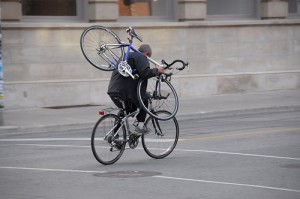From Bike Theft to Murder?
Posted on by Townsend MyersRecently I read an article in the Times Picayune which got me thinking about cycles of crimes: “NOPD approach to lesser crimes questioned by those focusing on murder rate.”
At heart of the article is the NOPD’s focus on setting up stings for crimes such as bike theft and prostitution. As we all know, New Orleans has the highest murder rate in the nation. Is NOPD wasting precious resources by focusing on lesser crimes?
The obvious answer is yes… The city’s jails are overcrowded with non-violent offenders while people are literally getting away with murder in this city. It takes a staggering amount of time for an officer to complete an arrest from point of contact to delivery and paperwork — time that officer could be using to catch the city’s violent criminals.
NOPD Superintendent Ronal Serpas defends his position: “Across the nation, police departments are finding that criminals are not specialists, they are generalists…Today’s bike thief is tomorrow’s armed robber,” he told the Times Picayune. Serpas says that the goal of the stings is not to nab first-time offenders, but to arrest chronic lawbreakers.
But what of those first-time offenders caught in the stings? Serpas says that his commanders look at criminal records before making a decision about arrest. It would be good to know more about how they deal with first-time offenders — and even the second and third-timers. What options are offered to these people?
Like I said, I’ve been pondering the cycles of crime. There is a correlation between low level crime and serious crime — our city is plagued by both. See New Orleans Crime Map So when we take the long view, maybe the NOPD strategy makes sense. Today’s bike thief might be tomorrow’s violent criminal.
But what options are we offering to petty thieves once they have been arrested? Are we offering them a chance to get their lives back on track? Is it prison and release — or is it education, rehabilitation, counseling?
Arresting a criminal when he is ONLY stealing a bike might prevent future crimes if there is an honest opportunity to offer an alternative life (and a life in prison is NOT the alternative we need to be offering). We DO need to find some way change the career trajectory of many of our citizens. However, for the “proactive arrest” approach to truly be successful, we must find other avenues post-arrest — like drug courts, or like the education programs I blogged about recently.
We can’t allow crime to be the most attractive career path our kids and young adults have.












